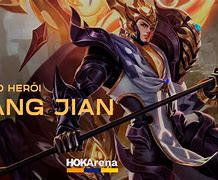
Lead the mobileMOBA industry
In 2015, Honor of Kings was released by TiMi Studio Group in China. Years of updates to character designs, worldview narratives, and gameplay optimization has made Honor of Kings the gaming phenomenon today.
Played by Millions of People
Honor of Kings recorded 100 million average daily active users in 2020, making it the top social entertainment choice in China. The game has inspired countless pieces of user-generated content, and many content creators have built successful careers from it.
Crafted With Global Partners
Through collaborations with internationally renowned composers including Hans Zimmer, Joe Hisaishi, and Howard Shore, Honor of Kings continues to provide enchanting, high-quality soundtracks for players to enjoy. In 2019, the game score won the Gold Medal at the Global Music Awards.
Esports With$10M Prize Pool
With the new upgrades to 2022 Honor of Kings International Championship, we are committed to building it into the world’s top esports. We spare no effort to bring vitality for the esports industry and we believe that the $10 million prize pool would be a shot in the arm.
Offenbar hast du diese Funktion zu schnell genutzt. Du wurdest vorübergehend von der Nutzung dieser Funktion blockiert.
Wenn dies deiner Meinung nach nicht gegen unsere Gemeinschaftsstandards verstößt,
Memimpin industri mobile MOBA
Pada tahun 2015, Honor of Kings dirilis oleh TiMi Studio Group di Tiongkok. Pembaruan desain karakter, narasi cerita perspektif dunia, dan optimalisasi permainan game selama bertahun-tahun sudah membuat Honor of Kings menjadi fenomena dalam industri game saat ini.
Dimainkan oleh Jutaan Orang
Honor of Kings mencatat adanya 100 juta pengguna aktif harian rata-rata di tahun 2020, membuatnya menjadi pilihan utama hiburan sosial di Tiongkok. Game ini telah menginspirasi banyak pembuat konten untuk membuat konten game dan karier mereka menjadi sukses.
Dibuat bersama dengan Global Partners
Melalui kolaborasi dengan komposer ternama internasional seperti Hans Zimmer, Joe Hisaishi, dan Howard Shore, Honor of Kings terus memberikan musik latar yang menarik dan berkualitas bagi para pemain. Pada tahun 2019, game ini memenangkan Medali Emas di Global Music Awards.
Esports dengan Pool Hadiah $10M
Dengan peningkatan baru untuk 2022 Honor of Kings International Championship, kami berdedikasi untuk membuat game ini menjadi esports terbaik di dunia. Kami berusaha keras untuk membuat industri esports menjadi hidup dan seru. Kami yakin dengan Pool Hadiah sebesar $10 juta akan memberikan dampak yang besar dan menarik pemain dunia.
Valdemar II (born 1170, Denmark—died March 28, 1241, Denmark) was the king of Denmark (1202–41) who, between 1200 and 1219, extended the Danish Baltic empire from Schleswig in the west to include lands as far east as Estonia. In his later years he worked to unify Denmark’s legal and administrative systems.
The son and brother, respectively, of the Danish kings Valdemar I and Canute IV, Valdemar acted as the duke of Schleswig from 1188 and conquered Holstein (North Albingia) and Hamburg (1200–01). Succeeding to the throne in 1202, he initially supported the Welf candidate for the office of Holy Roman emperor, Otto IV, who in turn recognized Valdemar’s sovereignty in Holstein. Valdemar later broke with Otto, defeated a Welf coalition (1214), and supported Otto’s rival, the future emperor Frederick II, who yielded to Valdemar the Wendish (Slavic) lands and the German territory north of the Elbe and Elde rivers.
Active from 1206 in crusades to Christianize the eastern Baltic region, Valdemar launched a campaign in Estonia in 1219, aided by the Knights of the Sword, Bishop Albert of Riga, and a Wendish navy. After his victory at Reval (Tallinn), Valdemar ruled over all of Estonia, and the country was divided into two bishoprics, Reval and Dorpat (Tartu). Conflicts with his allies led to a reapportionment of the Estonian dominions (1222), after which he retained only Reval and northern Estonia.
Kings and Emperors (Part III) Quiz
Shortly after crowning his son Valdemar as joint king (1218) to perpetuate his dynasty’s control over the vast Danish empire, Valdemar was surprised, captured, and imprisoned with his son by Count Heinrich of Schwerin (in northeast Germany) and held until 1225, his Danish and German vassals failing to come to his aid. After prolonged negotiations, he agreed to retain only Rügen and Estonia beyond the Baltic as a condition of release; in addition, he surrendered his sons and many hostages and paid a heavy ransom. In 1227 he launched a counteroffensive but was decisively defeated at Bornhöved, and his North German empire was finished. Danish sovereignty was also challenged in Estonia, but by an agreement with the Knights of the Sword (1238), Valdemar retained his possessions there.
Despite his foreign reverses, Valdemar’s rule in Denmark was strong. He carried through domestic reforms, completing the reorganization of the Danish army begun by Valdemar I and granting landed peasants exemption from taxes in return for knight service. He effectively controlled the church and the nobility, reformed the legal code, and changed the legislative system to enlarge monarchical power, as described in his revised Law of Jutland (1241). His division of Denmark into large feudal estates, each controlled by one of his sons, contributed to the destructive competition for power after his death.



